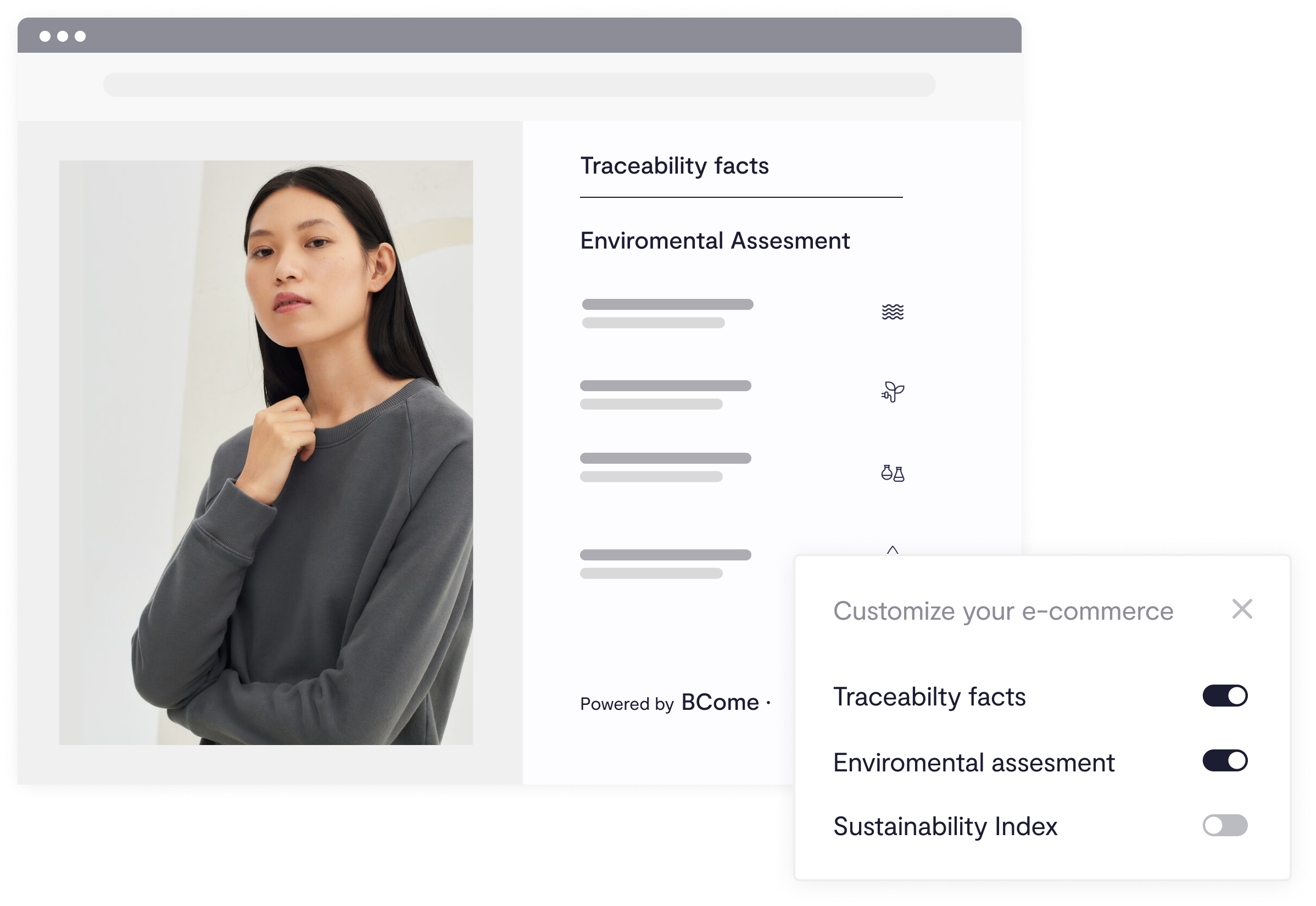Now that we’re aware of the main greenwashing practices applied in the fashion industry, the time has come for your business to take note of the essential information that it must disclose to ensure honest communication. As accuracy is one of the qualities we most admire at BCome, we’ve decided to pass this query on to Mathilde Fiorletta, BCome’s Environmental Engineer. Find out what is the key data that your fashion company must reveal to guarantee transparency in its communications.
While the brands that lead sustainability recognize data as a decision-making tool, there is a large volume of professionals who are concerned with defining which data is most relevant to their business, as well as with guaranteeing its accuracy.
When communicating information about sustainability to final consumers, the use of (accurate) data is an essential resource
Things are getting tough lately for sustainability data. Since news broke that Norway could ban brands that use the Higg Index to make sustainability claims, there have been plenty of headlines questioning the credibility of companies that support their sustainable performance through Life Cycle Assessment.
However, there is no doubt that both when assessing the sustainable performance of a product and when communicating this information to final consumers, the use of (accurate) data is an essential resource.
At BCome we keep our vision of trusting knowledge to make decisions that support the sustainable commitment of fashion brands. Seeing the accusations of greenwashing against companies that make their impacts public, we defend data not only as a tool that offers transparency, but also enables transformation. Let’s see what BCome’s Environmental Engineer, Mathilde, has to say about this.
What is your vision about impact communication in the fashion industry?
M: The fashion industry is way delayed in terms of communication of its potential sustainability impact. On one hand, labels lack transparency and full traceability is very difficult to reach. This makes impacts almost impossible to calculate since there is no assessment without data. On the other hand, there is also a lack of clear recommendations and requirements at the international and European levels. Even if impact communication in the fashion industry is essential since the final consumer needs and wants to know what he/she is buying, this weak framework allows for false claims and misleading communications.
What aspects do you think businesses are not taking into account when calculating their impact?
M: Most of the time, businesses are only focusing on calculating their carbon footprint. Global warming is an urgent and relevant topic but not representing all the negative effects of fashion on sustainability. If we look more in detail, the textile industry is a great contributor to water scarcity in arid areas due to vegetal fiber cultivation, therefore depriving humans and ecosystems access to water, which is a basic need. The use of pesticides and synthetic fertilizers is another harmful contributor to the eutrophication and acidification of marine and freshwater ecosystems, deeply altering biodiversity. Finally, the use of plastic fibers such as polyester and nylon is not only producing greenhouse gases but also contributes to the abiotic depletion of fossil fuels since standard polymers are oil derivatives.
Before communicating any impact, the challenge for brands is to have a precise picture of their value chain
We cannot forget that sustainability is also about social responsibility, which is not often communicated. Social impacts are not easy to evaluate since, with the exception of average wages, their measurement is most of the time qualitative. However, any business should be aware of its impacts on human rights, health and safety, working conditions, and animal welfare. Before communicating any impact, the challenge for brands is to have a precise picture of their value chain and of all the consequences that a decision can produce on the environment and on society.
What data do you think should be mandatory for any fashion company to make public?
M: Traceability is the beginning of everything. Starting by making public the country of origin of all the raw materials used in the final product, as well as the location of the different processes that it has undergone, would make it possible to collect relevant information on the product’s life cycle and therefore better calculate its impact. Also communicating the exact composition of the product should be mandatory, not just focusing on the main fabrics as it is done nowadays.
In the future, what indicator do you think will be essential to know?
M: I think it will be important to focus efforts on estimating better the circularity of the products, mainly concerning their use phase and functionality. We will need to implement good characterization models and testing methods for estimating the potential length and intensity of the use of garments after selling them. The challenge is also to address and be able to rely on appropriate consumer behaviors, making them aware of the importance of using their garments until they are worn out and finally optimizing decision-making at the time of disposing of them (by relying on recycling or reusing instead of throwing them away).
Microplastics released during washing cycles are also a great challenge to measure. It is an indicator that is also widely dependent on consumer washing practices. Nevertheless, the choice of synthetic material is up to the brand, as well as the choice of strong construction methods for improving fabric robustness and resistance to washings and adequate care labeling.
Impact measurement is a challenge for the fashion industry. Access to quality information that allows the impact of textile products to be defined with higher accuracy is essential for any business that wishes to improve its sustainable performance. In a context in which the quality of public databases is underestimated, we encourage trusting partners who choose to continue working to enhance the rigor of data. BCome is committed to provide reliability and transparency. We recurrently update our methodology based on new data released in order to offer the most accurate environmental results.
We believe that information is power and only by measuring our performance, we’ll be able to improve the impact of fashion. At BCome, we trust in evidence over assumptions to ensure the creation of products that respect the planet and the people who live on it. Do you want to learn how? Let us show it to you!

Mathilde Fiorletta is the Environmental Engineer at BCome.






